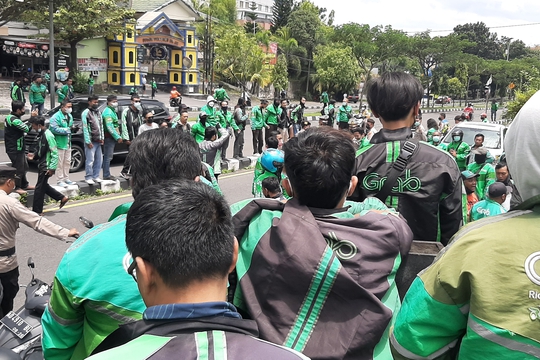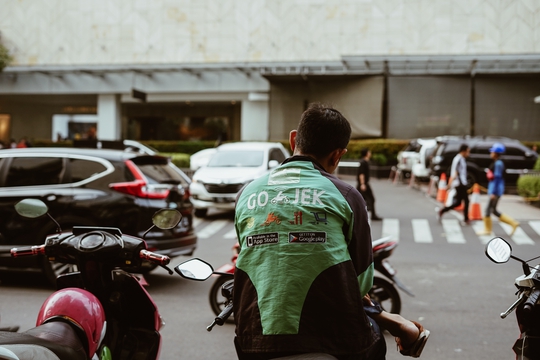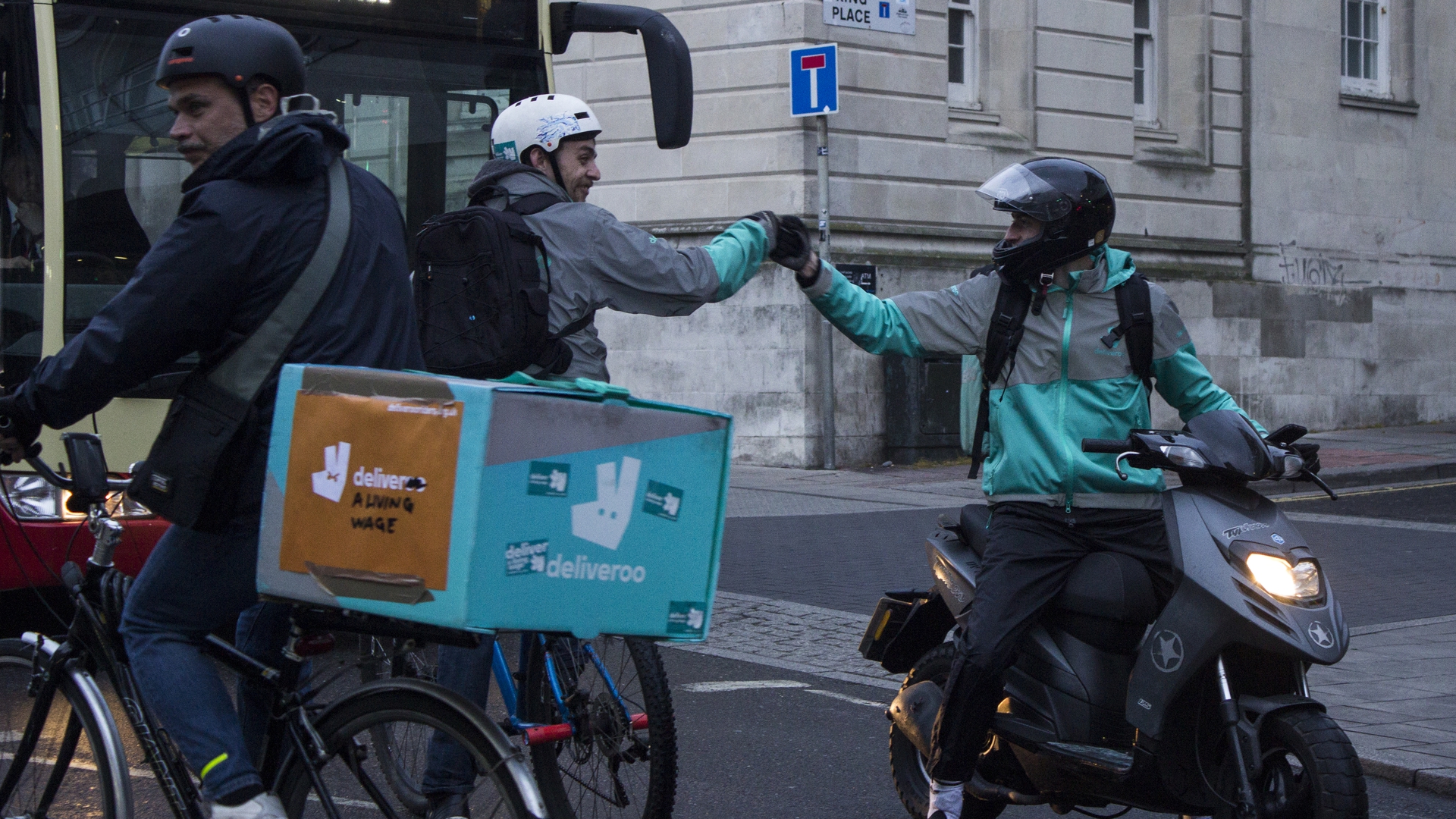The Rise of Gig Worker Protests in Indonesia
by
Arif Novianto (@arifnovianto_id)
June 8, 2022
Notes on Transport Platform Drivers’ Resistance Against Precarity during the COVID-19 Pandemic

inquiry
The Rise of Gig Worker Protests in Indonesia
by
Arif Novianto
/
June 8, 2022
Notes on Transport Platform Drivers’ Resistance Against Precarity during the COVID-19 Pandemic
The wave of resistance carried out by gig workers in the transport platform sector in Indonesia experienced a major increase during the COVID-19 pandemic. The COVID-19 pandemic has become a trigger for the opening of vulnerable working conditions experienced by platform drivers based on digital platforms in passenger, goods and food delivery services. As informal workers are classified as independent contractors, this vulnerability occurs because platform drivers do not get various rights, compared to the formal sector. For example, minimum wages, social protection, the right to regular paid holidays, decent working hours of 40 hours/week, and also job security.
The vulnerabilities experienced by platform drivers before the COVID-19 pandemic were subsidized by their incomes which tended to be larger during the honeymoon period, which is the period of launching start-ups that run a money-burning strategy. In the money-burning period carried out by Gojek and Grab in 2015-2019, the gross income (basic rate + incentives) for car drivers reached 581,892 rupiahs per day and motorcycle online drivers reached 381,712 rupiahs per day in 2018 (see Figure 01). Their gross income is about 3 times the average minimum wage in Indonesia. Better earnings have made protests by platform drivers in the 2015-2019 period tend to be less directed to the company’s platform to demand decent fares and various rights. During this period, the demands of platform drivers tend to be more directed at the legalization of online transportation which was previously called illegal by Law No. 22 of 2009 on Road Traffic and Transportation.
Different things happened during the COVID-19 pandemic. Various platform driver actions emerged that were widespread and intensified the fight against precarity they experienced. The COVID-19 pandemic, which began hitting Indonesia in March 2020, has made the gross income of platform drivers decrease by 67% compared to before the pandemic. This happened because platform companies such as Gojek and Grab took advantage of the momentum of the COVID-19 pandemic to begin ending their money-burning strategy. The steps they took were to cut the amount of incentives for platform drivers to almost nothing and cut the amount of promotions to consumers. This condition affects the income of drivers, their average income which was previously 266,225 rupiah/day in February 2020, dropped to 89,267 rupiah/day in April 2020.
Figure 1: Platform Driver’s Revenue per Day in 2018 – 2020 (in Rupiah) in Gojek, Grab, and Maxim platform

Note. What is meant by “motorcycle” is a driver who uses two-wheeled motorbikes, and works in ride-hailing, goods delivery, and food delivery services. Meanwhile, what is meant by “car” is a driver who uses a car and works in a ride-hailing service. The survey was conducted in June – October 2020 in three provinces in Indonesia: DI Yogyakarta, DKI Jakarta, and Bali.
The initial period of thunderous resistance from platform drivers took place in 2020, which was triggered by the abolition of incentive schemes because it affected their net income. During the period March – December 2020, there were 24 protests carried out by gig workers involving around 22,080 platform drivers. The 24 protests from platform drivers took place in 16 cities in Indonesia carried out by Gojek, Grab, and Maxim drivers with 17 protests demanding the return of the old incentive scheme and decent rates.
The Rise of Platform Driver Resistance
The research method used to collect data about online driver protests in Indonesia was online participant observation. I joined about 44 social media groups (Facebook and Whatsapp) of online drivers in Indonesia and took notes every time they protested from August 2020-March 2022. I also conducted interviews to find out the details of the actions and tracking the online mass media related to the protests carried out by platform drivers. With this method, I was able to collect information about the date of the action, the method of action, the demand for action, the number of masses of action, the platforms of the drivers involved in the action, and measure the response to the demand for action.
There are various forms of resistance by platform drivers in Indonesia. The forms of resistance they took started from starting online petitions, carrying out infra-political resistance (sharing complaints on social media, doing driver account therapy to get lots of orders, or trying to take advantage of loopholes in the platform system), and carrying out wide-scale resistance, namely protests involving mass mobilization. Infra-political resistance is more individual or limited in nature, not aiming to change the settings within the platform in order to provide them with better working conditions. This practice of infra-political resistance tends to be the embodiment of a weapon of the weak. In contrast to infra-political resistance, broad-scale resistance aims to change the setting of the platform, either through government policies or policies within the platform itself.
Two forms of resistance, namely infra-political resistance and broad-scale resistance, in some cases collided and created horizontal conflicts among drivers. That’s because trying to win over structural demands, such as decent rates and fair working conditions, requires a large amount of driver involvement. There is a tendency that drivers engaged in infra-political resistance do not want to be involved in the wider struggle. In some cases, they actually take advantage of every strike or mass action carried out by other drivers to gain profits, because there are opportunities to get orders in large quantities.
The increasing precarity experienced by platform drivers in Indonesia has encouraged them to take various actions of resistance on a wide scale. If in 2020 there were 24 protests, there will be an increase in 2021 to 28 protests. The method of action carried out by online drivers in 2021 is by striking, sealing the platform company offices, sending petitions, and mass actions to government offices and platform company offices. In 2021, 67.8% of the protests (19 actions) had a primary demand for decent rates.
The issue of setting decent fares has become the main struggle of platform drivers during the COVID-19 pandemic. This rate issue is important because it has a major influence on the daily income of platform drivers. This happens because they are classified as independent contractors, so platform drivers are paid not based on their working time, but based on the piece-rate work or paid based on the number of orders completed. The decent fares in question are the setting of the basic fares for each consumer order that allows them to meet their living needs which are equivalent to living wages. The issue of decent fares is important, along with the sharp decline in the daily income of online drivers in Indonesia reaching 67% at the beginning of the COVID-19 pandemic.
If in 2020 the main issue demanded by platform drivers is the return of the old incentive scheme, in 2021 the main issue is decent fares. It should be noted that the payments received by platform drivers take 3 forms, namely basic rates (regulated by the government), incentives (the will of platform companies), and tips from consumers (philanthropy from consumers and uncertain). As incentives for platform drivers begin to decrease until they almost run out in 2020, in 2021 what platform companies reduce is the basic rate. The downward step is inseparable from the competition between platform companies in Indonesia to dominate the platform transportation market share and to beat its competitors. On the one hand, the step to reduce the fares received by drivers is used as ammunition to compete in order to lower prices and create promotional schemes for consumers. The goal is for consumers to prefer their platform because it is cheaper than other platforms. On the other hand, instead of lowering the ordering fee/platform fee charged (100% goes to platform companies) to consumers in order to lower prices to compete with other platforms, platform companies have actually cut rates for drivers because these platform workers have a weak bargaining position. This means that under the pretext of competition, each platform company does not want to reduce its profit potential and prefers to sacrifice platform drivers.
The competition between platform companies, which has reduced the welfare of online drivers or created a race to the bottom, is possible because the regulation of fares for food and goods delivery services in Indonesia is left to the market mechanism. Meanwhile, currently, only fares arrangements for ride-hailing services are regulated by the government through Minister of Transportation Regulation Number 12 of 2019. Although the fares for ride-hailing services have been regulated, since the pandemic there has been no fare increase (1,850-2,650 rupiahs per km). At the same time, the price of fuel and basic necessities in Indonesia continues to increase, so the fares in this ride-hailing service are also the target of protests from platform drivers. That’s why, most of the protests from online drivers in 2021 are directed at demanding decent fares and have involved around 45,430 online drivers.
Figure 2: Number of Platform Driver Protest during COVID-19 Pandemic in Indonesia

Note. based on field data
In 2022, when the issue of the COVID-19 pandemic began to decline, various protests from platform drivers continued to surface. This shows that the COVID-19 pandemic is not the main cause of the decline in the welfare of platform drivers. From January – March 2022, there have been 19 protests run by platform drivers. In the first three months of 2022, the number of drivers involved in protests reached 64,450 people, consisting of drivers at Gojek, Grab, Maxim, and Shopee Food. The targets of their protests are the government as the regulator and the platform companies. To the regulators, the main demands of platform drivers are the need for regulations that protect platform drivers from arbitrary actions by platform companies, both regulations that regulate reasonable rates to real partnerships. Meanwhile, the demands aimed at platform companies are more related to restrictions on opening new online drivers, reduced commission by 20% charged to drivers, establishing fair partnerships, and also regarding decent fares.
The increase in the number of actions and the number of masses of platform drivers involved in protests in Indonesia is intensifying their resistance to the unfair system of gig work on the platform. The increase in precarity that platform drivers experience has prompted the involvement of many platform drivers to fight, although most of them are still spontaneous. In the various struggles they carried out, social media became an important arena for the process of organizing and expanding the resistance.
Previously, the resistance movement was mostly spontaneous through wildcat strikes, now several platform driver unions in Indonesia are actively working to demand justice. One of them is the Indonesian Online Drivers Union (Seroja) which was declared at the end of 2020 and currently has around 7,500 platform drivers as members. In addition, there are also traditional labor unions that have started to organize platform drivers, namely the Aerospace and Transportation Workers Union, Federation of Indonesian Metal Workers Union (SPDT FSPMI). Meanwhile, in a broader context, there is already a solid alliance among the community of platform drivers in fighting for better working conditions.
The roar of platform drivers’ fight for justice and better working conditions is not going away any time soon. This happened because of the competition between platform companies to increase the precarity of platform drivers. The platform company not only lowers incentives and fares to platform drivers, but also continues to open new driver registrations and competes to avoid driver rights. The existence of a grey space in the classification of independent contractors and bogus partnership practices is used by platform companies to be more exploitative. Meanwhile, the Indonesian government seems to allow this to continue and instead praises this technology giant as a best practice in business practices.
author
Arif Novianto (@arifnovianto_id)
Subscribe to Notes from Below
Subscribe now to Notes from Below, and get our print issues sent to your front door three times a year. For every subscriber, we’re also able to print a load of free copies to hand out in workplaces, neighbourhoods, prisons and picket lines. Can you subscribe now and support us in spreading Marxist ideas in the workplace?
Read next

No Union Is a Problem
by
Arif Novianto
/
Aug. 24, 2021

